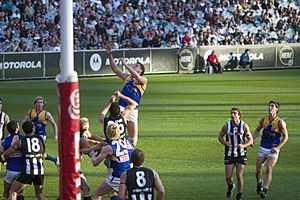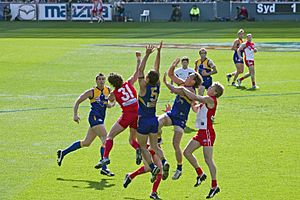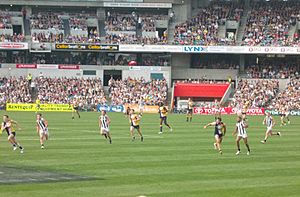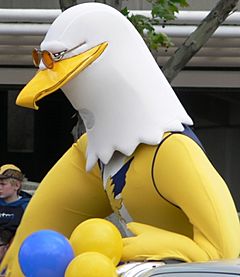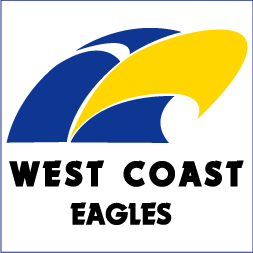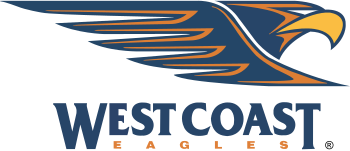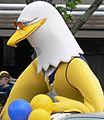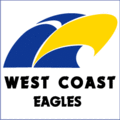West Coast Eagles facts for kids
Quick facts for kids West Coast Eagles |
||||
|---|---|---|---|---|
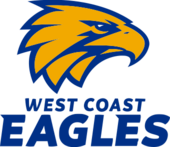 |
||||
| Names | ||||
| Full name | West Coast Eagles Football Club | |||
| Nickname(s) | Eagles Waalitj Marawar |
|||
| 2024 season | ||||
| Home-and-away season | AFL: 16th AFLW: 13th WAFL: 10th |
|||
| Leading goalkicker | AFL: Jake Waterman (53 goals) AFLW: Kellie Gibson (8 goals) WAFL: Shannon Lucassen (23 goals) |
|||
| Club details | ||||
| Founded | 20 October 1986 | |||
| Colours | Royal blue gold | |||
| Competition | AFL: Senior men AFLW: Senior women WAFL: Reserves men |
|||
| Owners | WA Football | |||
| Chairman | Paul Fitzpatrick | |||
| CEO | Don Pyke | |||
| Coach | AFL: Andrew McQualter AFLW: Daisy Pearce WAFL: Kyal Horsley |
|||
| Captain(s) | AFL: Oscar Allen and Liam Duggan AFLW: Emma Swanson WAFL: Jack Eastough and Shannon Lucassen |
|||
| Premierships | AFL (4)
|
|||
| Ground(s) | AFL: Optus Stadium (61,266) AFLW/WAFL: Mineral Resources Park (6,500) |
|||
| Former ground(s) | WACA Ground (1987–2000) Subiaco Oval (1987–2017) |
|||
| Training ground(s) | Mineral Resources Park | |||
| Uniforms | ||||
|
||||
| Other information | ||||
| Official website | WestCoastEagles.com.au | |||
The West Coast Eagles are a professional Australian rules football club. They are based in Perth, Western Australia. The club started in 1986 and first played in 1987. They were one of two new teams to join the Australian Football League (AFL). Back then, it was called the Victorian Football League.
The Eagles play their home games at Optus Stadium. Their main office and training ground are at Lathlain Park. The West Coast Eagles are fully owned by WA Football. This group also owns the Fremantle Football Club, which is the other AFL team from Western Australia.
The West Coast Eagles are one of the most successful clubs in the AFL. They have won four premierships, which is the second-highest number since 1990. They were the first team from outside Victoria to play in and win an AFL Grand Final. This happened in 1992. The Eagles also won premierships in 1994, 2006, and 2018. They are a very popular club with many members. In 2021, they had over 106,000 members, more than any other club.
West Coast also has a women's team in the AFLW competition. They also have a reserves team in the WAFL.
Contents
- Club History: How the Eagles Started and Grew
- Club Business and Supporters
- Club Identity and Symbols
- Club Achievements and Awards
- Club Rivalries
- Reserves Team
- AFL Women's Team
- Images for kids
- See also
Club History: How the Eagles Started and Grew
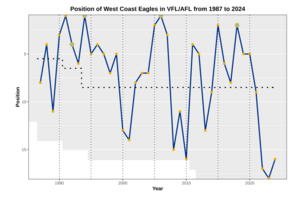
Early Years: 1986–1989
The West Coast Eagles joined the Victorian Football League (VFL) in 1986. They were one of two new teams, along with the Brisbane Bears. Ron Alexander became the first coach in September 1986. Most of the first players came from the West Australian Football League (WAFL).
Ross Glendinning was the club's first captain. The Eagles played their first VFL game in March 1987. They beat Richmond by 14 points at Subiaco Oval. The team finished eighth out of fourteen clubs in their first season. After that, John Todd became the new coach. In 1988, the club made it to the finals for the first time. However, they didn't do as well in 1989, finishing 11th.
The Malthouse Era and First Championships: 1990–1999
Mick Malthouse took over as coach at the end of 1989. The league changed its name to the Australian Football League (AFL) in 1990. West Coast finished third that year. They reached the preliminary final but lost to Essendon.
John Worsfold became captain in 1991. The club finished first in the regular season, losing only three games. They reached the grand final but lost to Hawthorn by 53 points. Peter Sumich kicked 111 goals that season. He was the first West Coast player to kick 100 goals in a season.
In 1992, West Coast finished fourth. They made it to the grand final again and defeated Geelong by 28 points. This made them the first team from outside Victoria to win a premiership. In 1994, they finished first again. They then beat Geelong in the grand final to win their second premiership.
In 1995, another AFL team from Western Australia, the Fremantle Football Club, was formed. This started the "Western Derby" rivalry. West Coast made the finals every year until 1999. However, they didn't reach another grand final. Worsfold retired in 1998, and Guy McKenna became captain.
Challenges and a New Coach: 2000–2005
Malthouse left the Eagles in 1999. Ken Judge became the new coach. The team's performance dropped in 2000 and 2001. They finished 14th in 2001, which was their worst result at the time. The club played its last game at the WACA Ground in 2000. Judge was replaced by former captain John Worsfold in 2001.
The club made the finals in 2002, 2003, and 2004. However, they couldn't get past the first final each time. Ben Cousins became the sole captain in 2002. The team improved with new players from the AFL draft. Chris Judd, who joined in 2001, won the Brownlow Medal in 2004. This award is for the best player in the league. He was the first West Coast player to win it.
In 2005, the Eagles had a great start, winning 15 of their first 16 games. They finished second and reached the grand final against Sydney. They lost by just four points. Chris Judd won the Norm Smith Medal for being the best player in that grand final. Ben Cousins won the Brownlow Medal in 2005, making it two years in a row for an Eagles player.
Another Premiership and Tough Times: 2006–2010
West Coast finished first in 2006. They won 17 out of 22 games. In the finals, they lost to Sydney by one point. But they bounced back, beating the Western Bulldogs and Adelaide. They reached the grand final again, where they defeated Sydney by one point. This was a close rematch of the 2005 grand final. These two grand finals were part of a series of very close games between the two clubs.
In 2007, the club finished third. However, injuries led to them losing both their finals games. During these years, the club faced some difficult challenges off the field. These issues affected the team. Ben Cousins stepped down as captain before the 2006 season, and Chris Judd took over. Cousins left the club at the end of 2007. Judd also asked to be traded back to Victoria and joined Carlton. In return, the Eagles got Josh Kennedy and some draft picks.
Darren Glass became the new captain. The team then had a few tough seasons. In 2010, they finished last, which is called the wooden spoon. This was the longest time in the club's history without playing in the finals.
Building Back Up: 2011–2013
Many people thought West Coast would finish near the bottom again in 2011. But they surprised everyone by winning 16 games and finishing in the top four. They became the first team since 1999 to reach a preliminary final after finishing last the year before.
The Eagles continued their strong performance in 2012. They finished fifth and reached the semi-finals, losing to Collingwood. In 2013, the team was expected to do very well. However, injuries and poor form led to them finishing 13th. Coach John Worsfold resigned in September 2013.
The Simpson Era: A Fourth Premiership and Recent Challenges: 2014–2024
Adam Simpson became the new coach for the 2014 season. Darren Glass was captain but retired mid-season. Five players shared the captaincy for the rest of the year. West Coast had a good start but finished ninth. Midfielder Matt Priddis won the Brownlow Medal that year. He was the third Eagles player to win this award.
Shannon Hurn was named sole captain in December 2014. In 2015, West Coast had a great season. They finished second and reached the Grand Final, their first since 2006. However, they lost to Hawthorn. The next season, 2016, was a bit disappointing. They lost their elimination final to the Western Bulldogs, who went on to win the premiership.
In 2017, West Coast finished eighth. They won a thrilling elimination final against Port Adelaide in extra time. But they lost the next week to Greater Western Sydney.
Most people didn't expect West Coast to do well in 2018. But after losing their first game at the new Optus Stadium, they won 10 games in a row. They faced some injuries to key players like Josh Kennedy and Jack Darling. Star ruckman Nic Naitanui suffered a serious knee injury. Midfielder Andrew Gaff was suspended for eight weeks. Despite these challenges, the team kept fighting. Jeremy McGovern kicked a goal after the siren to win a game against Port Adelaide.
The Eagles finished second in 2018. They hosted Collingwood in a qualifying final and won. In the preliminary final, they played Melbourne. West Coast dominated the game, winning by 66 points.
In the 2018 Grand Final, West Coast played Collingwood again. It was a very exciting game. Collingwood led by a lot early on, but the Eagles fought back. With just over two minutes left, Dom Sheed kicked a goal from a tough angle to put the Eagles ahead. West Coast won 79 to 74, claiming their fourth premiership. Luke Shuey won the Norm Smith Medal for his great performance.
The Eagles started their 2019 season with some losses. But they recovered well, winning 12 of their next 14 games. They finished fifth on the ladder. They beat Essendon in the first final but lost to Geelong the next week.
The 2020 season was affected by the COVID-19 pandemic. Games were paused and then played in a "hub" environment. West Coast had a tough start but recovered to finish fifth. They lost a close elimination final to Collingwood by one point at Optus Stadium.

The 2021 season marked the end of a successful period for the Eagles. They struggled and missed the finals for the first time since 2014, finishing ninth. It was the first time since 2009 that neither Western Australian team made the finals.
Over the next two years, many key players were injured or sidelined due to COVID-19. The team's performance declined quickly. In 2022, the Eagles finished 17th. The 2023 season was the club's worst ever. They lost five games by over 100 points and finished 18th, earning their second wooden spoon.
On July 9, 2024, Adam Simpson was no longer the coach. Andrew McQualter was appointed the new senior coach in September 2024.
Club Business and Supporters
Ownership and Finances
The West Australian Football Commission (WAFC) has owned the West Coast Eagles since 1989. The club used to be owned by a company called Indian Pacific Limited. The WAFC bought most of the shares in 1990. The last small shareholders were bought out in 2000.
In the 2010s, West Coast paid about $3 million in rent to the WAFC for using Subiaco Oval. They also gave 50–70% of their profits to the WAFC. In 2023, the West Coast Eagles reported a profit of $1.9 million.
Membership and Game Attendance
The West Coast Eagles have a large number of members. In 2011, they had 54,745 members, which was a club record then. Membership numbers were limited by the size of Subiaco Oval. In 2012, the waiting list to become a member was over 20,000 people.
In July 2015, the club reached over 60,000 members. Membership grew even faster after the club moved to Optus Stadium and won the 2018 premiership. In 2019, they had 90,445 members, the second-highest in the league. The club had the most members in the AFL in 2020 (100,776) and 2021 (106,422).
The biggest crowd for a West Coast game at Optus Stadium was 59,608 people. This was for a preliminary final against Melbourne in 2018. The highest attendance for any game featuring West Coast was 100,022 people. This was at the Melbourne Cricket Ground for the 2018 grand final against Collingwood.
Number One Ticket Holder
Most AFL clubs have a "number-one ticket holder." This is a well-known supporter of the club. West Coast chooses people who have shown long service, passion for the club, and contributions to Western Australia. They also look at how well-known they are in their job. Number-one ticket holders usually serve for two years.
Club Identity and Symbols
Colours and Logos
West Coast's official colours are royal blue and gold. They used navy blue from 1995 to 2017 but returned to royal blue in 2018.
The club's current logo shows the head of a wedge-tailed eagle in royal blue and gold. The words "West Coast Eagles" are written below it. This logo was introduced in 2018 to look more like a real eagle. The previous logo, used from 2000 to 2017, was more artistic. All the club's logos have featured an eagle's head facing east. This represents the eagle looking towards its prey in the eastern states of Australia.
The club has a mascot named Rick "The Rock." He is a bald eagle and was created in 2003 to help promote the club to younger fans. A real wedge-tailed eagle named Auzzie has flown around the field before West Coast home games since 2007.
Uniform Changes Over Time
In 2018, the Eagles' home uniform returned to the royal blue design used before 1999. It was updated with the new logo. The away uniform also got the new logo but stayed mostly the same.
From 2000 to 2015, the home jumper had a stylised eagle on a mix of navy blue, white, and gold. In 2010, the Eagles also started wearing a third, mostly white uniform. This was to avoid colour clashes with other teams. In 2016, a navy blue version of the royal blue jumper became the home uniform. The club updated its brand again on November 1, 2017, before moving to Perth Stadium in 2018.
Here's how West Coast's uniform has changed:
|
1987–1988
|
1988–1994
|
1995–99
|
2000–15
|
2016–17
|
2018–present
|
Club Song
The club's official team song is "We're the Eagles." It was written by Kevin Peek. The original version from 1987 was played after the 1992 and 1994 grand final wins. It was changed in the late 1990s.
A modified version of the late-1990s song was used from 2018 to 2019. From 2020 to 2024, an updated version was used, with vocals by Ian Kenny from the band Birds of Tokyo. As of 2025, the club returned to their original 1990s version. The song "Eagle Rock" by Daddy Cool is also traditionally played after wins at home games.
Headquarters and Training
The West Coast Eagles trained and had their main office at Subiaco Oval from 1987 until 2019. In 2019, they moved their main training and office base to Mineral Resources Park.
Club Achievements and Awards
Premierships and Finishing Positions
The West Coast Eagles have won four AFL premierships. They have also finished as minor premiers (top of the ladder before finals) three times.
| Premierships | |||
| Competition | Level | Wins | Years won |
|---|---|---|---|
| Australian Football League | Seniors | 4 | 1992, 1994, 2006, 2018 |
| Finishing positions | |||
| Australian Football League | Minor premiership (McClelland Trophy) |
3 | 1991, 1994, 2006 |
| Grand Finalist | 3 | 1991, 2005, 2015 | |
| Wooden spoons | 2 | 2010, 2023 | |
| AFL Women's | Wooden spoons | 1 | 2022 (S6) |
| West Australian Football League | Wooden spoons | 4 | 2021, 2022, 2023, 2024 |
Life Members
Players who have played 150 games for the club automatically become life members. Other people who have made a big contribution to the club, like coaches and staff, can also be inducted.
Team of the Decade (1996)
In 1996, the Eagles named their "Team of the Decade" to celebrate 10 years of the club.
| Backs: | David Hart | Michael Brennan | Ashley McIntosh |
| Half backs: | Guy McKenna | Glen Jakovich | John Worsfold |
| Centres: | Peter Matera | Dean Kemp | Chris Mainwaring |
| Half forwards: | Brett Heady | Mitchell White | Craig Turley |
| Forwards: | Chris Lewis | Peter Sumich | Tony Evans |
| Ruck: | Ryan Turnbull | Don Pyke | Dwayne Lamb |
| Interchange: | Chris Waterman | Steve Malaxos | Peter Wilson |
Team 20 (2006)
In 2006, for their 20th anniversary, the West Coast Eagles named their greatest team of the past twenty years.
| Backs: | David Wirrpanda | Ashley McIntosh | Michael Brennan |
| Half Backs: | Guy McKenna | Glen Jakovich | John Worsfold (Captain) |
| Centres: | Peter Matera | Dean Kemp | Chris Mainwaring |
| Half Forwards: | Brett Heady | Mitchell White | Chris Lewis |
| Forwards: | Phillip Matera | Peter Sumich | Tony Evans |
| Ruck: | Dean Cox | Chris Judd | Ben Cousins |
| Interchange: | Chris Waterman | Drew Banfield | Don Pyke |
| Dwayne Lamb | |||
| Coach: | Michael Malthouse |
Team 25 (2011)
For their 25th anniversary in 2011, the West Coast Eagles named their greatest team of the past twenty-five years.
| Backs: | David Hart | Darren Glass | Michael Brennan |
| Half Backs: | Guy McKenna | Glen Jakovich | John Worsfold (Captain) |
| Centres: | Peter Matera | Ben Cousins | Chris Mainwaring |
| Half Forwards: | Brett Heady | Mitchell White | Chris Lewis |
| Forwards: | Phillip Matera | Peter Sumich | Tony Evans |
| Ruck: | Dean Cox | Dean Kemp | Chris Judd |
| Interchange: | Daniel Kerr | Ashley McIntosh | Don Pyke |
| Andrew Embley | |||
| Emergency | David Wirrpanda | Dwayne Lamb | Matt Priddis |
| Coach: | Michael Malthouse |
Individual Player Awards
Brownlow Medal Winners
The Brownlow Medal is given to the best player in the league each season. Umpires vote for this award.
- Chris Judd (2004)
- Ben Cousins (2005)
- Matt Priddis (2014)
Norm Smith Medal Winners
The Norm Smith Medal is given to the best player in the AFL Grand Final.
- Peter Matera – 1992
- Dean Kemp – 1994
- Chris Judd – 2005 (from the losing team)
- Andrew Embley – 2006
- Luke Shuey – 2018
Coleman Medal Winners
The Coleman Medal is given to the player who kicks the most goals in the AFL season.
- Scott Cummings (88 goals) – 1999
- Josh Kennedy (75 goals) – 2015
- Josh Kennedy (80 goals) – 2016
AFL Rising Star Winners
The AFL Rising Star award is for the best new player in the league each season.
- Ben Cousins – 1996
Goal of the Year Winners
This award is for the best goal kicked in a season.
- Ben Cousins – 1999
- Mark Merenda – 2001
- Daniel Kerr – 2003
- Chris Judd – 2005
- Harley Reid – 2024
Mark of the Year Winners
This award is for the best catch (mark) taken in a season.
- Ashley Sampi – 2004
- Nic Naitanui – 2015
- Liam Ryan – 2019
All-Australian Team Selections
The All-Australian team is a special team made up of the best players from the league each season.
| Year | Eagles Players & Coaches Selected |
|---|---|
| 1987 | Phil Narkle |
| 1988 | Steve Malaxos |
| 1991 | Guy McKenna, Chris Mainwaring, Peter Matera, Craig Turley, Mick Malthouse (coach) |
| 1992 | Dean Kemp |
| 1993 | Peter Matera, Guy McKenna |
| 1994 | Peter Matera, Guy McKenna, David Hart, Glen Jakovich |
| 1995 | Glen Jakovich |
| 1996 | Peter Matera, Chris Mainwaring, Mitchell White |
| 1997 | Peter Matera, Fraser Gehrig |
| 1998 | Ben Cousins, Ashley McIntosh |
| 1999 | Ben Cousins |
| 2001 | Ben Cousins |
| 2002 | Ben Cousins |
| 2003 | Michael Gardiner, Phil Matera |
| 2004 | Chad Fletcher, Chris Judd |
| 2005 | Ben Cousins (vice-captain), Dean Cox, David Wirrpanda |
| 2006 | Ben Cousins, Chris Judd, Dean Cox, Darren Glass, John Worsfold (coach) |
| 2007 | Dean Cox, Darren Glass, Daniel Kerr |
| 2008 | Dean Cox |
| 2010 | Mark LeCras |
| 2011 | Dean Cox, Darren Glass |
| 2012 | Dean Cox, Darren Glass (captain), Nic Naitanui, Beau Waters |
| 2015 | Matt Priddis, Josh Kennedy (vice-captain), Andrew Gaff |
| 2016 | Josh Kennedy, Jeremy McGovern |
| 2017 | Josh Kennedy (vice-captain), Jeremy McGovern, Elliot Yeo |
| 2018 | Shannon Hurn, Jeremy McGovern, Andrew Gaff, Adam Simpson (coach) |
| 2019 | Shannon Hurn (vice-captain), Jeremy McGovern, Elliot Yeo, Jack Darling |
| 2020 | Brad Sheppard, Nic Naitanui, Liam Ryan |
| 2021 | Nic Naitanui |
| 2024 | Jeremy McGovern, Jake Waterman |
Club Rivalries
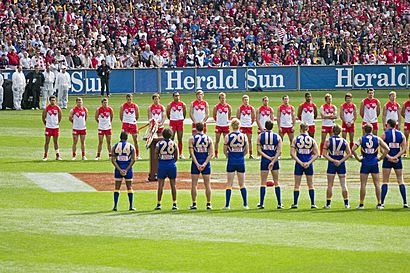
The Eagles' biggest rivalry is with the Fremantle Football Club. Fremantle is the only other AFL club based in Western Australia. These two teams play each other twice every season in what is called the "Western Derby". The Eagles have won 32 of the 56 derbies played. West Coast holds the record for winning 11 derbies in a row. These games are usually almost sold out.
The club also had an early rivalry with the Hawthorn Hawks. This started from exciting games in the early 1990s, especially the 1991 Grand Final. This was seen as the first big rivalry between teams from different states. In 2015, the two clubs met again in another grand final, which Hawthorn won.
Another rivalry is with the Sydney Swans. This comes from a series of six very close games between 2005 and 2007. These included the 2005 and 2006 Grand Finals. The total difference in scores across these six games was only 13 points, which is an AFL record.
Reserves Team
| West Coast Eagles | ||
|---|---|---|
| Names | ||
| Full name | West Coast Eagles Football Club | |
| 2022 season | ||
| Home-and-away season | 10th | |
| Club details | ||
| Founded | 2019 (as a reserves side) | |
| Competition | WAFL | |
| Coach | Robert Wiley | |
| Captain(s) | Jackson Nelson | |
| Ground(s) | Mineral Resources Park (6,500) | |
| Training ground(s) | Mineral Resources Park | |
| Uniforms | ||
|
||
The West Coast reserves team plays in the West Australian Football League (WAFL). This team helps develop players for the main AFL team.
Reserves Team History
West Coast did not have its own reserves team for many years. They partnered with other WAFL clubs. From 1999, they worked with the Claremont Football Club. From 2000 to 2001, they were linked with the Perth Football Club.
From 2012 to 2013, the WAFL clubs decided to end these partnerships. The Eagles then worked with the entire WAFL. A new partnership started in 2014 with the East Perth Football Club. This ended in 2018.
In 2019, the Eagles decided to have their own stand-alone reserves team. This team did well at first, finishing fourth in 2019. They did not play in 2020 due to COVID-19 rules. When they returned in 2021, they finished last.
In 2022, West Coast's reserves team only won one game. In 2023, they had a very tough season, losing five games by over 100 points. Their 19-game losing streak ended in round 13 with a draw against Perth.
AFL Women's Team
In September 2017, the AFL gave the West Coast Eagles a license to have a team in the AFL Women's (AFLW) league. Their first season was in 2020. The women's team plays home games at Lathlain Park, Perth Stadium, and Leederville Oval.
Images for kids
-
Chart of yearly ladder positions for West Coast in AFL
-
Michael Gardiner contests a boundary throw-in against Collingwood during the 2005 season.
-
Daniel Chick and Tyson Stenglein in a marking contest against Sydney in the 2005 Grand Final.
-
Subiaco Oval during a match against Fremantle in the 2008 NAB Cup.
-
The West Coast Eagles and Sydney Swans line up for the national anthem at the 2005 Grand Final.
See also
 In Spanish: West Coast Eagles para niños
In Spanish: West Coast Eagles para niños
 | Sharif Bey |
 | Hale Woodruff |
 | Richmond Barthé |
 | Purvis Young |


